Shareware and gore: Remembering the original version of Blood
We're rerunning Richard Cobbett's classic Crapshoot column, in which he rolled the dice and took a chance on obscure games—both good and bad.
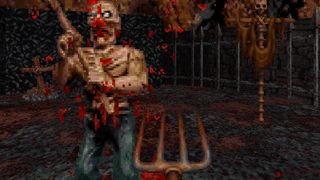
From 2010 to 2014 Richard Cobbett wrote Crapshoot, a column about rolling the dice to bring random games back into the light. Today, a shooter that wore its heart on its sleeve. Somebody's heart, anyway. And their liver, lungs, and three different flavours of goo.
Occasionally, old games resurface for a new era. At the moment, it's Shadow Warrior's turn. I've already done it though, so this week I thought we'd take a look at its undead sister game—one that will probably never see a similar treatment no matter how much fans demand it, simply because it's one of those games whose rights issues have firmly turned out to be wrongs. It's an interesting game though; like Shadow Warrior, a shooter that managed to do a lot with very little, without the painful comedy racism.
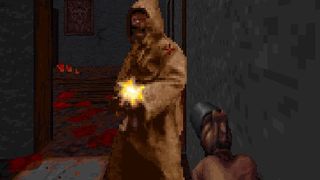
Blood is the story of Caleb, a former gunslinger turned elite "Chosen" in a cult devoted to Tchernobog, god of flushing toilets. Everything is just cherry, until Tcherny turns on the Chosen faster than you can say '3D rendered intros were really hard in 1997', declares that the four have failed him, and has his new elite forces dispatch them.
One is carried off by a giant spider, another by Cerberus, and Caleb's possibly-it's-a-little-confused undead lover by a gargoyle. Caleb himself though is merely teleported into a surprisingly spacious empty grave, presumably because Tchernobog suddenly realised he didn't have enough elite soldiers for everyone but didn't want to get his hands messy. Besides, it's not like one man armed with a pitchfork for some reason is likely to cause a god much trouble, right?
Now, to be fair, what's actually happening is that Tchernobog has made a couple of rookie evil overlord mistakes. First, his idea of elite soldiers are people made of packing peanuts. More importantly, his actual intention is that Caleb rampage through the cult to become incredibly powerful, at which point he can take his power and punch through into the world to bring his special flavour of pitch-lowered evil to the masses. Suffice it to say, this is a better idea for evil gods who aren't vulnerable to conventional weapons, or whose plans are better served by not having had all of their minions massacred.
This being a '90s shooter though, plot isn't too important, and was still the kind of thing shoved into readme files and the like rather than properly implemented. That's little excuse though for a story like this—the text-version of Caleb's plight in all its whatever the heck this is supposed to be.
Caleb awakens in cold and damp in a body he no longer knows. It has long lain as a corpse that refused to rot, protected from putrefaction by some unearthly link to its master. The pain of protesting muscle and flesh invigorates and awakens him. He welcomes it. It distills his hate into the maelstrom raging in the center of his mind. An agonizing cry breaks out of him, shattering the stone lid of the tomb in which he lies, knocking loose sediment, cobwebs, and the small, unnoticed creatures that have shared his grave with him. A single word rings out through the darkness, echoing Tchernobog's lingering howl: "Why?"
The biggest gaming news, reviews and hardware deals
Keep up to date with the most important stories and the best deals, as picked by the PC Gamer team.
"It distills his hate into the maelstrom raging in the center of his mind" indeed. By Tchernobog's giant sweaty balls, that's not just regular old purple prose, it's purpureus.
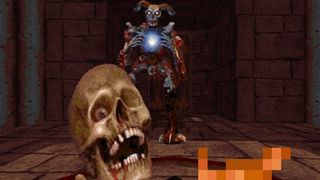
Anyway. Much of Blood is what you'd expect. In keeping with the shareware style at the time, it's four episodes split into individual levels, where Caleb has to get from the start point to a sigil at the end. In his way are locked doors that all use the same key, which he never bothers keeping, and an army of undead monsters—zombies, cultists, fire-spitting dogs, spiders and so on, plus a few bosses.
Its weapons are a little different from normal, if not in concept them in terms of raw sadism. A pitchfork to the face may not be all that powerful, but still looks nastier than a fist. The pistol slot was taken up by a flare gun whose shots stick in enemies and continue burning until they flare up. An aerosol can does double duty as a flame thrower and a molotov cocktail. Finally, one of the higher-end weapons is a voodoo doll that can be used to spike enemies at a distance, with Caleb accidentally stabbing himself in the hand if there isn't one around to feel the pricking sensation in their undead soul. All pretty cool stuff for a horror game, even if games like Rise of the Triad (another shooter seeing a return) splashed far more gore from its weapons. Blood preferred pain and torture over mere floods of red.
(Anecdotally, one of my favourite things about Blood involves the US supermarket chain Wal-Mart. During the '90s, it was such a powerful yet conservative retailer that companies would create special versions of games minus the blood or with other changes to be sold in its stores. One of them? Blood, complete with its red-handprint box recoloured a bright slime green. Of all the games...)
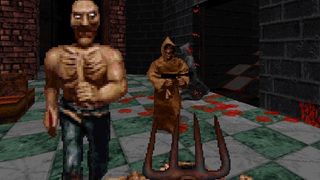
What made Blood special though was... well, actually two things. Firstly, while Duke Nukem had already established himself as the FPS hero with attitude, Caleb's gravel-voice gave him a real run for his money. He's a pure villain protagonist who happens to be fighting a bigger evil than himself at the moment, and spends most of the time quipping. Where Duke largely pinched lines from The Evil Dead and similar films though, Caleb's world is made of horror references. His initial "I live... again!" gives way to constant quips or quotes. He's a fun character, not least because he thoroughly enjoys his role as an avenging angel with jet black wings and arsenal of increasingly cruel weapons.
That mostly works though because of the level design, with most stages riffing on something specific. The first stage for instance is a cemetery, Morningside, as in Phantasm. A later level does the hotel from The Shining. There's a pub called Cask Of Amontillado Pub & Grille. Check out this comprehensive reference list. To say that this was a world worth exploring would be a bit of an overstatement because it's standard FPS design in most ways, but there were a ton of things for genre fans to 'get'.
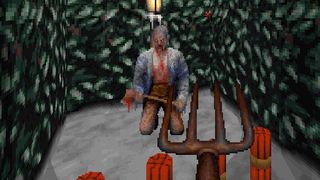
Rather than purely relying on this though, the level design... in the shareware version at least... was phenomenal. Quake was already out, so the Build engine was far from the technological powerhouse it was when Duke Nukem 3D arrived. It still had its charm though, with its sprite-based worlds and enemies allowing far more character for developers who knew how to use it. Shadow Warrior would stretch things to clever tricks like faking portals and really pushing world interaction. Blood was no slouch with it though, with arguably its two best levels coming in the shareware version. It was right on the edge of FPS games shaking off the classic 'here are a load of corridors and monsters, go to it' style of design in favour of being able to recreate actual places—something that again Duke had taken the vanguard on, but Blood's developers were able to take further while crafting their own 1920s-era world.
The first is hard to convey now, because so many other games have done something similar. Caleb is on a train running through the countryside, and the train actually is running through the countryside. Being able to run along the sides as well as inside was an incredible technological achievement for an FPS engine the time, even if the scenery offered no detail and it was very obviously working like a treadmill. Like a lot of Blood, it had an attention to detail that simply wasn't expected, like putting a few zombies in the way of the train even though most players would have turned around by that point to start the level, and animating the wheels that would only be seen if they subsequently fell off.
That level is nothing though compared to the one that follows, and the secret level linked from it, Dark Carnival. The name suggests it's going to be fun. The design is absolutely superb—Build engine gimmickry at its finest.
Along with the regular cultist-apocalypse, this stage adds a number of carnival games to play to win prizes. Most are target-shooting jobs, so not exactly a challenge for Caleb. The most memorable though takes the way that the engine lets you kick around disembodied heads and turns it into a little football challenge: get the heads into the gaping mouth. Another section I thought was clever at the time sees Caleb able to climb up and do tightrope walking over a snake-pit, making good use of an animated texture and a couple of sticky-out sprites to convey the writhing mass below. The effect fails utterly if you actually fall in, but works great from the intended perspective.
Careful exploration of the level also reveals the first episode's secret level, House of Horrors. This is an entire level set around a ghost train full of enemies and torture rooms, and again a wonderfully detailed bit of '90s design. It's not the greatest stage as an FPS space, but the shrinking corridors and use of a river to push the player forward. Again, it's a thing of its time. Compared to others of its era though...
Blood was definitely one of those games that more people played and enjoyed the shareware version of than actually picked up the full thing— side-effect of both the episodic model, and everyone knowing that developers often put their best ideas into the first chapter. Blood... well, it tried, but most of its more ambitious stuff like a city of the dead just isn't up to the same standard, with the limited textures especially soon becoming pretty painful as the designers try their damnedest to create things like a mall with nothing but concrete and grime and a few similar bits and pieces.
Still, there was a fair amount of interest when the sequel was announced, Blood 2: The Chosen. It turned out to be mostly pants though, shifting the timeframe to the future, with primitive full-3D characters and worlds, very little charm, and some odd decisions like gender-swapping Chosen member Gabriel into Gabriella as part of Satan's new equality policy, and turning the evil Cabal into one of those silly futuristic supercorporations called... CabalCo. Say it with me, people: Urrrrrrrrgh. Shogo, it was not. And that's when Shogo was awesome, rather than now, where it's better fondly remembered than replayed.
That said, check out the .plan update dated 8/1/97. Blimey. Things were very, very different before marketing departments took control of essentially all developer-to-public interaction...
Most Popular




